
Jean-Alfred Villain-Marais, known professionally as Jean Marais, was a French actor, film director, theatre director, painter, sculptor, visual artist, writer and photographer. He performed in over 100 films and was the lover, muse and friend of acclaimed director Jean Cocteau. In 1996, he was awarded the French Legion of Honor for his contributions to French cinema.

Royal Affairs in Versailles is a 1954 French-Italian historical drama directed by Sacha Guitry. Described as "a historical film showing Versailles from its beginnings to the present day", it tells some episodes through portrayal of the personalities who lived in the Palace of Versailles. Its sister films are Napoléon (1955) and If Paris Were Told to Us (1956).
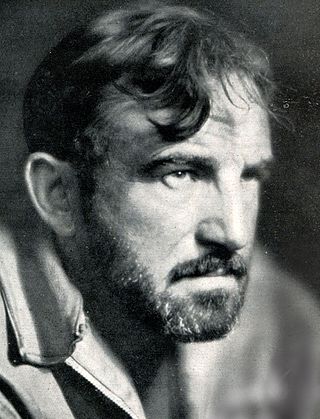
Charles-Marie Vanel was a French actor and director. During his 65-year film career, which began in 1923, he appeared in more than 200 films and worked with many prominent directors, including Alfred Hitchcock, Luis Buñuel, Jacques Feyder, and Henri-Georges Clouzot. He is perhaps best remembered for his role as a desperate truck driver in Clouzot's The Wages of Fear for which he received a Special Mention at the Cannes Film Festival in 1953.
![<i>Le Bonheur</i> (1934 film) 1934 [[Cinema of France|France]] film](https://upload.wikimedia.org/wikipedia/en/8/8f/Lebonheur.jpg)
Le Bonheur ("Happiness") is a 1934 French comedy-drama film directed by Marcel L'Herbier. It was adapted from Henri Bernstein's play Le Bonheur, which Bernstein had staged in Paris in March 1933 with Charles Boyer and Michel Simon in leading roles; Boyer and Simon took the same parts in the film.

Gaby Morlay was a film actress from France.

Millionaires for One Day is a 1949 French comedy film directed by André Hunebelle and starring Gaby Morlay, Jean Brochard and Ginette Leclerc. It was shot at the Francoeur Studios in Paris. The film's sets were designed by the art director Lucien Carré. It was produced and distributed by Pathé.
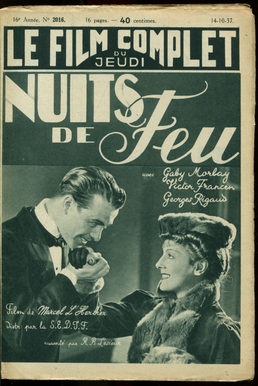
Nights of Fire is a 1937 French drama film directed by Marcel L'Herbier and starring Gaby Morlay, Victor Francen and Madeleine Robinson. The scenario is based on the 1901 work The Living Corpse by Leo Tolstoy. The film's sets were designed by the art directors Guy de Gastyne and Eugène Lourié while the costumes were by Georges Annenkov.

The Blue Veil is a 1942 French drama film directed by Jean Stelli and starring Gaby Morlay, Elvire Popesco and André Alerme. The film was remade in 1951.

Sacred Woods is a 1939 French comedy film directed by Léon Mathot and starring Elvire Popesco, Gaby Morlay and Victor Boucher. It was based on a play by Robert de Flers and Gaston Arman de Caillavet which had previously been made into a 1915 Italian film by Carmine Gallone. The film's sets were designed by the art director Robert Gys.
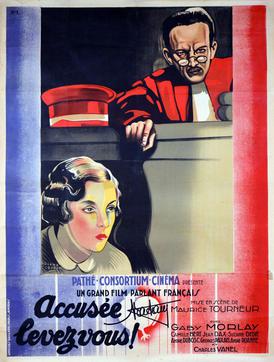
Accused, Stand Up! is a 1930 French crime film directed by Maurice Tourneur and starring Gaby Morlay, Suzanne Delvé and Camille Bert. After the two female stars of a Parisian cabaret are seen arguing, one of them turns up dead. This leads to the arrest and trial of the other until the real culprit is caught.

Paris-New York is a 1940 French comedy crime film directed by Yves Mirande, Claude Heymann and Georges Lacombe. It stars Gaby Morlay, Michel Simon and André Lefaur. It was shot at the Cité Elgé studios in Paris and aboard the SS Normandie. The film's sets were designed by the art director Andrej Andrejew. It was produced during the Phoney War period and released shortly before the Fall of France.

Quadrille is a 1938 French comedy film directed by Sacha Guitry and starring Guitry, Gaby Morlay and Jacqueline Delubac. It was shot at the Joinville Studios in Paris and on location around the city. The film's sets were designed by the art director Jean Perrier. The title refers to the quadrille, a dance in which the participants keep changing partners. It was later remade as a film of the same title by Valérie Lemercier.
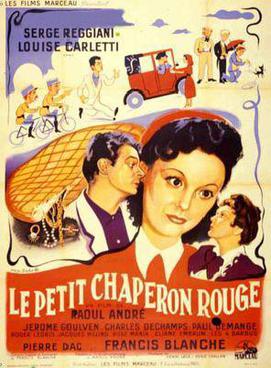
Good Enough to Eat is a 1951 French comedy film directed by Raoul André and starring Gaby Morlay, Louise Carletti and Serge Reggiani. It draws inspiration from the story of Red Riding Hood.

Once Upon a Time is a 1933 French drama film directed by Léonce Perret and starring Gaby Morlay, André Luguet and Andrée Ducret.

Montmartre is a 1931 French drama film directed by Raymond Bernard and starring Gaby Morlay, Line Noro and Florelle. Two sisters struggle to stay above water in the poverty-stricken suburbs of Paris. It was a remake of a 1925 silent film Montmartre that had also starred Morlay.

Dance Hall is a 1931 French drama film directed by Maurice Tourneur and starring Gaby Morlay, Charles Vanel and Madame Ahnar. The film's sets were designed by the art director Robert Gys.
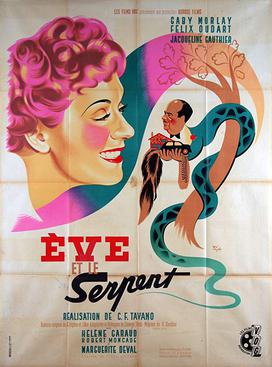
Eve and the Serpent is a 1949 French comedy film directed by Charles-Félix Tavano and starring Gaby Morlay, Félix Oudart and Jacqueline Gauthier.

Mademoiselle Béatrice is a 1943 French comedy film directed by Max de Vaucorbeil and starring Gaby Morlay, André Luguet and Louise Carletti. The film's sets were designed by the art director Raymond Druart.

White Wings is a 1943 French drama film directed by Robert Péguy and starring Gaby Morlay, Jacques Dumesnil and Marcelle Géniat. It was shot at the Photosonor Studios at Courbevoie in Paris. The film's sets were designed by the art directors Lucien Jaquelux and Lucien Aguettand.




![<i>Le Bonheur</i> (1934 film) 1934 [[Cinema of France|France]] film](https://upload.wikimedia.org/wikipedia/en/8/8f/Lebonheur.jpg)














